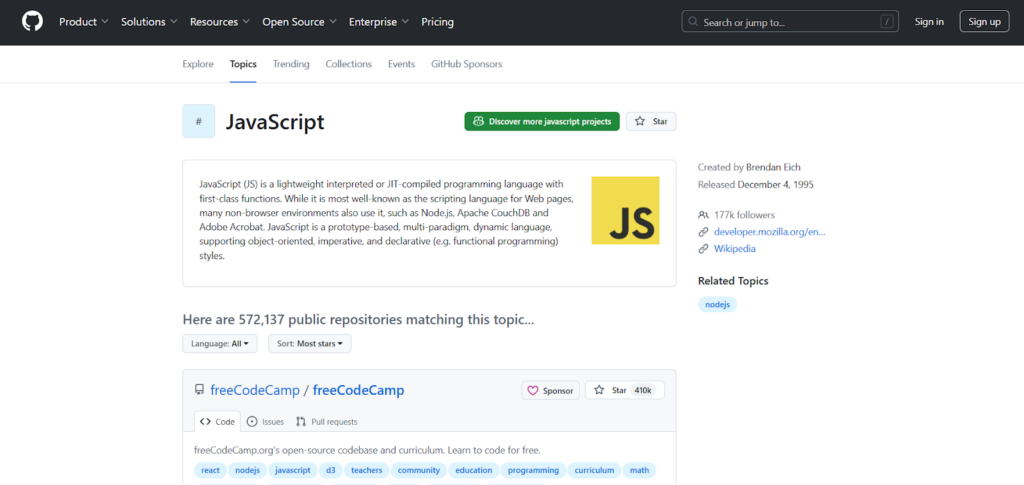JavaScript is one of the most widely used programming languages, playing a central role in web development. Whether you’re looking to build interactive websites, create mobile applications, or explore backend development, JavaScript provides the flexibility and functionality needed to develop a wide range of digital solutions. Its widespread adoption across industries makes it a valuable skill for both beginners and experienced programmers.
Understanding JavaScript: What It Is and How It Works
Before learning a new programming language, it’s critical to understand its purpose and capabilities. This is particularly relevant for JavaScript, a popular language used in web development. JS is a computer language that is mostly used to create interactive websites. While HTML structures a webpage’s content and CSS determines its design, JS provides dynamic features that improve the user experience. A webpage without JS may appear sophisticated but remains stagnant.
JavaScript enables interactivity by supporting features such as drop-down menus, modal windows, contact forms, animations, video players, and interactive maps. Beyond frontend development, JavaScript is now a versatile, full-stack language used on both the client side (frontend) and server side (backend) with the advent of Node.js.
On the frontend, JS runs directly in the user’s web browser, interpreting and executing code in real time. On the backend, it operates on remote servers, enabling efficient data processing and server-side functionalities.
JavaScript’s applications extend beyond websites. It is also used to develop browser-based games, mobile applications (with the help of frameworks), and even backend programs for web and server applications. As new libraries and frameworks are developed, JS remains one of the most versatile programming languages used in various applications today.
Why Learn JavaScript?
JavaScript is essential for anyone interested in web development, but its benefits go beyond just coding websites. Whether pursuing a career in tech or simply looking to develop a useful skill, learning JS opens up a wide range of opportunities.
JavaScript is a Versatile Programming Language
Originally developed for web browsers, JavaScript has evolved into a versatile language used across various industries. Its adaptability makes it one of the most widely used programming languages today.
- Web Applications: JS powers both frontend (React, Angular, Vue) and backend (Node.js, Nest.js, Express) development;
- Mobile Apps: React Native enables cross-platform iOS/Android apps, with Flutter and Ionic expanding capabilities;
- Desktop Apps: ElectronJS allows cross-platform desktop development using web technologies;
- Big Data & Cloud: Works with NoSQL databases like MongoDB and supports cloud platforms like AWS, Google Cloud, and Azure;
- Blockchain: JS contributes to Ethereum smart contracts using Solidity;
- Automation: Automates tasks, manages workflows, and processes Excel files with ExcelJS;
- Game Development: Enables interactive experiences using Unity and web-based engines;
- Emerging Tech: Supports IoT with Raspberry Pi, machine learning with TensorFlow.js, and AI projects. Learn more about innovative Raspberry Pi hacks and how JavaScript enhances IoT development.
High Demand and Competitive Salaries
According to the Devskiller IT Skills and Hiring Report 2020, 72% of firms are looking for JavaScript workers. JS is still the most popular programming language, making it a valued talent in the employment market. Job listings on platforms like Indeed and LinkedIn consistently show tens of thousands of openings requiring JavaScript expertise.
The demand for JavaScript developers often exceeds the available talent pool. A HackerRank report for 2023 ranked JS as the fifth-most sought-after programming language, significantly ahead of many alternatives. Additionally, the rise of TypeScript, which builds upon JS, ensures its continued relevance in the industry.
JS is Easy to Start With
JavaScript is one of the most accessible programming languages for novices, making it an excellent starting point for coding.
One of its primary benefits is that it does not require any additional configuration—every current web browser has JavaScript by default. This enables newcomers to begin coding instantly, without the need to install extra tools or create a development setup.
Another benefit is the instant feedback it provides. Even with a small amount of code, results appear right away, making the learning process more engaging. Additionally, JavaScript has a large and active community on platforms like Stack Overflow, offering plenty of resources and support for those getting started.
Beyond being beginner-friendly, JS builds a strong foundation for learning other programming languages. It supports object-oriented, functional, and imperative programming styles, helping learners develop transferable skills that apply to languages like Python, Java, and C++. Learning JavaScript introduces essential coding principles that can benefit developers throughout their careers.
Strong Community Support

JavaScript has one of the largest and most active developer communities, making it easier to find solutions and guidance. Whether you’re working on a simple webpage or a complex application, there’s a wealth of resources available online. Stack Overflow, GitHub, GeeksforGeeks, and Hashnode offer lessons, troubleshooting tips, and conversations with experienced developers.
A strong community is essential when learning or working with any programming language. With JavaScript, getting quick help is much easier because of the sheer number of developers actively contributing. Whether you’re trying to repair an issue, explore new features, or learn best practices, there’s always someone willing to assist. The availability of shared information, mentorship, and open-source tools enhances JavaScript’s value for both novice and expert developers.
Enhancing Web Design with Interactive and Visual Elements
JavaScript goes beyond basic web page creation by allowing developers to build interactive and visually engaging elements that improve user experience. Features such as animations, real-time content updates, interactive maps, scrolling effects, and embedded videos make websites more functional and engaging. Companies and organizations prioritize well-designed, user-friendly interfaces, making JavaScript a crucial skill for web developers.
How Easy Is It to Learn JavaScript?
JavaScript is usually recognized as one of the most accessible programming languages for novices. Its simple and flexible syntax enables even individuals without prior coding knowledge to produce useful programs rapidly. Because JS is used on both the client and server sides, it is an essential tool in web development and lays a solid basis for learning more sophisticated programming ideas.
One of the reasons JavaScript is beginner-friendly is the availability of extensive learning resources. Online tutorials, interactive coding platforms, and a large developer community offer plenty of guidance, making it easier to get started. Many examples and practical exercises help new learners grasp core programming principles while experimenting with real-world applications.
However, as with any programming language, becoming proficient in JavaScript requires effort. Advanced concepts like prototype inheritance, asynchronous programming, and closures can be difficult to comprehend. Despite this, JavaScript remains an ideal starting point for anyone interested in pursuing a career in programming due to its broad use and practical use.
Why Start with Vanilla JS?

When learning JavaScript, an important decision is whether to start with plain JS, often referred to as “vanilla JS,” or to jump straight into using libraries and frameworks. Understanding the core language first provides a solid foundation for more advanced development.
Vanilla JavaScript refers to the standard, unmodified version of JS without the use of additional libraries or frameworks. It’s simply JS in its native form, following official standards. The term is used to emphasize coding in pure JavaScript rather than relying on prebuilt tools.
Libraries and frameworks are collections of prewritten code designed to simplify development, but they serve different purposes:
- Frameworks offer a defined base for developing applications. They describe the architecture and provide built-in tools to accelerate development. Popular JavaScript frameworks include Angular, Vue, and Ember;
- Libraries are smaller and more concentrated, with particular capabilities that may be included in projects as needed. Rather than creating repetitious code, developers may utilize libraries like as jQuery, Lodash, or Underscore to automate routine processes.
A helpful analogy is house construction: the framework acts as the foundation and structure, while libraries function like pre-made furniture, allowing developers to add features more efficiently.
Starting with vanilla JS helps developers understand the language’s core concepts before relying on external tools. Many frameworks and libraries rely on JavaScript rules, so knowing them first makes it easier to work with them later. It also increases problem-solving skills, debugging abilities, and a thorough grasp of how JS functions at its core.
Conclusion
JavaScript is still an essential programming language used in web development, mobile apps, backend systems, and new technologies. Its accessibility, adaptability, and strong community support make it an invaluable talent for both new and veteran developers. With a high demand in the job market and a wide range of practical applications, learning JavaScript provides a strong foundation for a successful career in programming.
